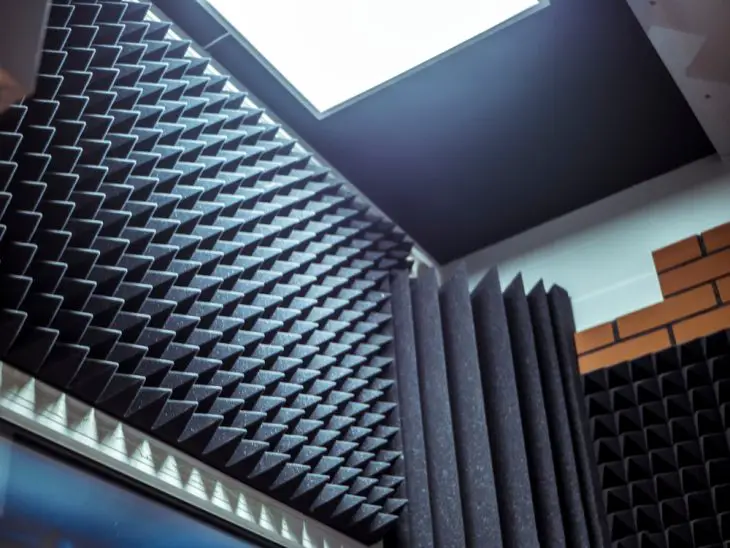Soundproofing an apartment can seem a daunting and somewhat futile task, especially if you are suffering from noisy neighbors or particularly bad noise pollution.

More people than ever live in crowded cities and cramped apartments, and even those who are able to live in houses still report issues with noise pollution and disturbances.

This has as much to do with poor quality buildings and planning as anything else, and this can make the problem seem insurmountable for the average person struggling to get enough sleep or relax in their own home.
However there are things you can do to improve your situation, and there’s certainly no need for you to suffer in silence… so to speak.
There are several DIY and purpose-built solutions you can use to help soundproof your apartment, and if you make a plan on how to deal with the problem you can massively reduce your issues and start enjoying your home much more.
In this guide, we’re going to look at some of the key things you need to do if you want to soundproof your apartment, looking at key areas to focus on, as well as some of the most popular and effective methods of soundproofing you can use to improve things.
Table of Contents
Key Areas To Focus On
When it comes to soundproofing, there are almost always a few key areas to focus on, particularly in apartments.
Sound tends to penetrate vulnerable areas such as doors, windows, floors, and thin walls very easily, and this can make it seem quite difficult to protect yourself when you are being assaulted on 3 or 4 different fonts.
There are things you can do to lessen the impact, however.
Doors
Soundproofing doors is all about beefing up the defenses without reducing the functionality of the door itself.
If it’s an exterior door this can be difficult as these doors are often already well fitted with gaskets and made of fiberglass which deflects sound very effectively.
For interior doors, however, there are several things you can do.
Installing a door sweep can prevent sound from creeping in under your door while adding a door gasket or a soundproofing rubber seal to the doorframe can also prevent sound creeping in through gaps in the doorframe.
It’s also possible to add acoustic panels or curtains to the door which can bolster the thickness of the door and help you to shut out the outside world and all of its disturbances.
This can make hearing a knock on the door a little more difficult though, so keep your ears peeled for visitors!
Windows
Windows are notorious for their lack of soundproofing, and even double-glazed windows let in a significant amount of sound.
You have limited options here, but a soundproof curtain is one of the most effective ways to help here, or other heavy material curtains if soundproof curtains are too expensive.
Walls
For walls, it can again be difficult to soundproof them, and it’s often best to work out which areas, in particular, are allowing the most sound through so you can invest your budget in shoring up your defenses in the right places.
Acoustic panels are the most popular and effective way to add soundproofing to your walls, and these often come as foam panels which can be found in many sizes and easily customized to fit into various spaces very well.
You can use other materials such as plywood but these are often less effective and much more unsightly than foam panels.
Ceilings And Floors
If you’re getting a lot of sound coming up through your floor, one option can be to use heavy rugs to help add some insulation but there’s really not much you can do if you live above loud neighbors.
The same is true if you have noisy neighbors above you.
Acoustic panels on the ceiling can help a little potentially, but the truth is that the amount of noise and energy being spent above you can make even significant soundproofing feel pointless when people are living above you and being very loud.
There are other things you can do to handle this though which we’ll touch on later.
Tips
If you’re still suffering from noise pollution or noisy neighbors there are some additional things you can do to try and make things easier.
- Use earplugs. This is often the last resort and not everyone can use or wants to use them, but earplugs can help you get a good rest and most people will get used to them after a little while of using them consistently. This is very much a temporary solution, however.
- Use White Noise. An alternative to blocking out noise pollution is to mask or cover it with your own more relaxing noise that you actually choose to listen to. White noise can be relaxing and help distract you from hearing the ambient noise and sound pollution created by neighbors or noisy streets.
- Speak to your Neighbors. Speaking to neighbors directly, openly, and honestly can resolve some issues altogether, as long as you remain calm and reasonable, and present your request in good conscience. Many people find this difficult and not all neighbors will be receptive to this approach, but it’s worth trying before escalating things, and many times this can solve issues before they start.
- Contact your landlord. If you’re renting, contact your landlord and explain to them that other tenants near you are causing problems and making your life difficult. You can explain that you’ve tried to reason with them fairly beforehand but that nuisance is still continuing. If they won’t help, it may be time to look for a new apartment…